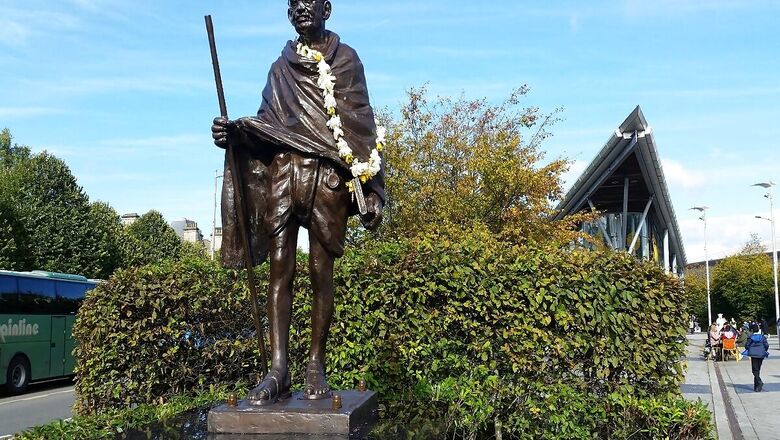
views
There is a question mark over the future of a statue of Mahatma Gandhi in Wales after an official Welsh government review into Britain's colonial and slave trading history drew up a list of memorials that require a rethink. The Slave Trade and the British Empire: An Audit of Commemoration in Wales' report released this week also shortlists the commemoration of Britain's war-time Prime Minister Winston Churchill and Robert Clive, referred to as Clive of India for his role in establishing Britain's colonial hold in India, as persons of interest to move to a second stage of the review process.
Wales has a bronze sculpture of Gandhi at Cardiff Bay, unveiled in 2017 to mark the 148th birth anniversary of the leader of the Indian national movement. In the audit, he has been classified under Category E of persons of interest who require examination as having been highlighted by campaigners. His comment in a speech in 1896 that whites were degrading Hindus and Muslims to a level of Kaffir' is taken as suggesting that he believed Indians to be better than Black Africans. "Historians have taken a range of views of his culpability, saying that it would have been premature to expect equality in turn-of-the-century South Africa or identifying Gandhi as having turned a blind eye to brutality against Africans, notes the audit document.
Nevertheless, Gandhi's later leadership in India inspired leaders in Africa, including Nelson Mandela. A statue of Gandhi in Pietermaritzburg was unveiled in 1993 by Desmond Tutu, it adds. The inclusion of Gandhi on the list is mainly linked with some online campaigns against similar sculptures in Leicester and Manchester. However, those campaigns have had widespread counter-campaigns in favour as well.
It was a matter of great pride that our city with the generous support of the donors was able to celebrate the life of Bapu who was so inspirational in the creation of modern India and such an example to the rest of the world, said Peter Soulsby, the Mayor of Leicester as he pledged to protect the city's Gandhi statue earlier this year. Meanwhile, Churchill also falls under Category E, with the audit taking note that specifically, he has been accused of failing to take sufficient action to relieve the Bengal famine of 1943 through his antipathy to Indian independence.
He expressed a belief in the superiority of the Anglo-Saxon race' and was opposed to dismantling the British Empire, taking a romanticised view of its achievements. These were not unusual attitudes in his Victorian-born generation, it adds. The assessment on Robert Clive, after whom a street is named in Wales, falls under Category A or people who took part in the African slave trade.
The East India Company took part in the slave trade from 1621 to 1843 (its territories were excluded from the abolition act of 1833). Robert Clive began as a junior employee in 1744, commanded military campaigns in India and rose to be the Company's Governor General until 1767, it reads. The Welsh government audit was launched in July this year in the wake of the worldwide Black Lives Matter protests, which included the very public toppling of the statue of slave trader Edward Colston in Bristol in southern England.
This audit is concerned with purposeful commemoration in the form of statues, street names and building names. Such commemorations in some cases put people who were responsible for slavery and exploitation literally or metaphorically on a pedestal', often without any accompanying interpretation, the report explains. The culpability of several of these individuals in slavery or other abuses is open to debate and interpretation. Several shifted their positions considerably as they considered issues in depth or as attitudes changed around them, it adds.
The Task and Finish Group behind the review states that its audit is intended to capture information and not provide any answers, with its findings now likely to progress to a next stage of analysing any actions required.
Read all the Latest News, Breaking News and Coronavirus News here


















Comments
0 comment